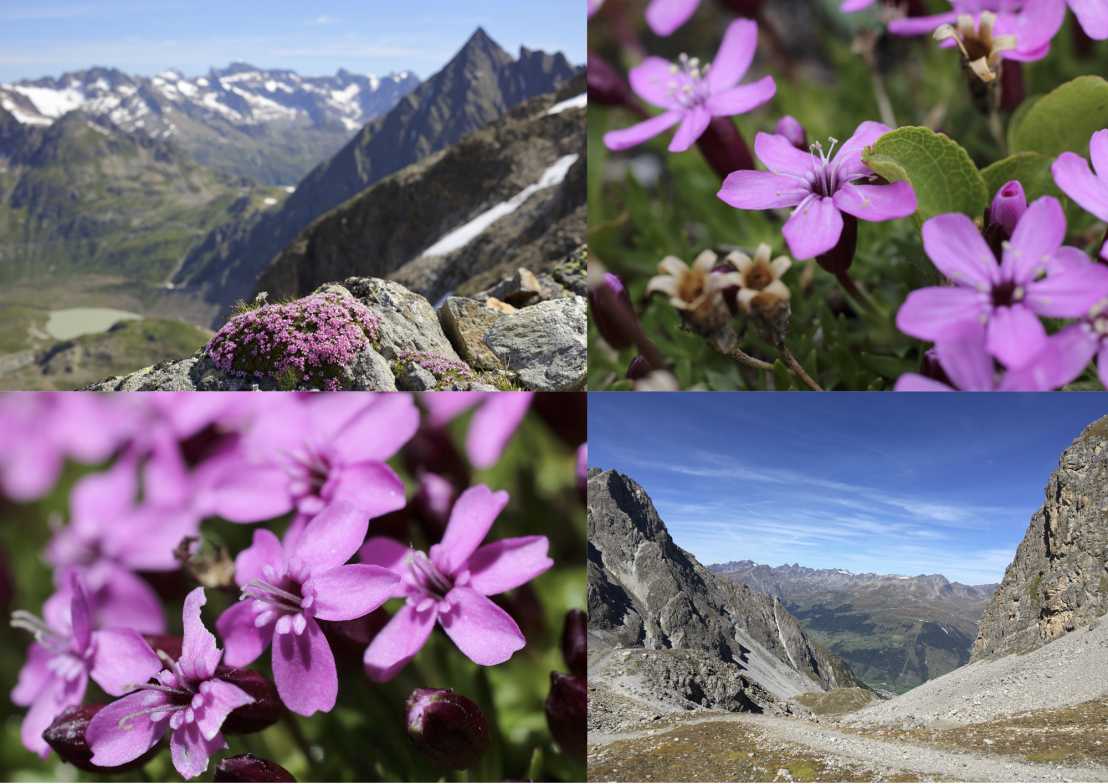Bachelor and Master Thesis
If you are interested in joining our group for a bachelor or master thesis or an internship, then please explore our Research site and contact the relevant group leader well ahead of your desired starting date. Your e-mail should include a few paragraphs that explain what you have studied, who you are, what the time frame for your planned project is, and why you would like to join our group.
Below is a list of possible research projects for a Bachelor or Master thesis. Please contact the person indicated if you would like to find out more about the project.
Research Projects Details:

In the Swiss Alps, two closely related cushion plant species are co-occurring that show different bedrock preference and sex systems. One species is Silene acaulis, which is trioecious (♀, ♂ and ⚥ cushions) and occurs primarily on calcareous bedrock. The other is Silene exscapa, which is dioecious (♀and ♂) and occurs on siliceous bedrock. To study the evolution of different sex stems, we assess the stability of sex expression and estimate the reproductive fitness of the different sexes in both species. We are looking for a Master student to work on this project, which includes field work at two monitoring sites in the canton of Grisons in the vicinity to Piz Linard and Piz Lischana (2,800 m a.s.l.)
The work of the MSc candidate may include:
- Measurement of flower traits in the different sexes of both species to assess differences in organ size and attractiveness to pollinators.
- Assessment of the spatial distribution of sexes and of the sex ratio in the two species.
- Estimation of the size and age of individual cushions.
- Estimate reproductive success in the wild of different sexes and species.
- Sampling of plant tissue and seeds for the analysis of spatial genetic structure and paternity.
- Genotyping of the plants using next-generation sequencing technology and inference of small-scale spatial genetic structure.
PI: Martin C. Fischer & Alex Widmer
Major: D-USYS; ETH Zurich
Season: Summer to Winter
Molecular evolution of conserved imprinted genes in wild tomatoes
Genomic imprinting occurs in the triploid endosperm of flowering plants, a seed compartment vital to the nourishment of the developing embryo. Imprinting refers to the biased expression of either the paternal or the maternal allele, and this (near) monoparental expression at some of these genes is likely to be critical for the success of developing seeds. A rich body of evolutionary theory to explain the evolution and maintenance of genomic imprinting has accrued, and the "kinship" or "parental conflict" theory posits differential interests of father and mother over the allocation of resources to offspring. Recent work on wild tomatoes has identified candidate imprinted genes in tomatoes that appear to be shared in their imprinted status in other flowering plants such as maize or Arabidopsis.
The proposed Master project could investigate such conserved imprinted genes for signatures of natural selection, in particular evidence of balancing selection that might manifest as haplotype structure and/or unusual patterns of polymorphism in DNA sequence data. The tomato clade is particularly suitable for this type of investigation because it comprises several closely related species with diverging mating systems; parental conflict is expected to be diminished under partial self-fertilization compared to obligate outcrossing. The project could make use of already existing data obtained from transcriptome sequencing, or could also generate new sequence data that would ideally encompass promoter (noncoding) regions adjacent to the coding regions of candidate genes. Data analyses would use programs for molecular population genetic analyses.
